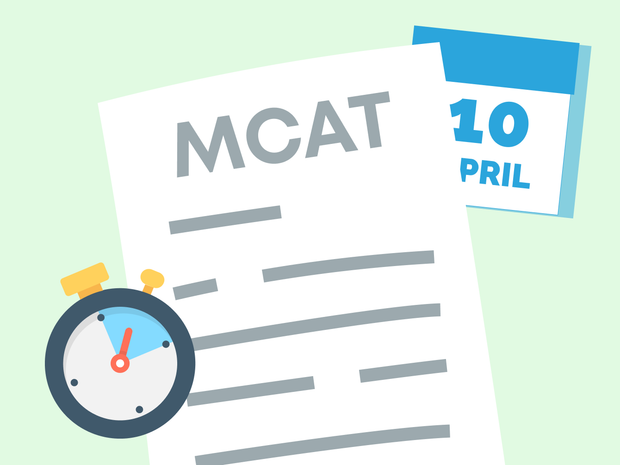“The MCAT’s easy!” said literally nobody, ever. Actually, the MCAT is incredibly overwhelming with a ton of science content to memorize and fundamental critical thinking and reasoning skills to master. In fact, studying for this exam is a full-time job: the outcome of which determines your very future as a medical healthcare professional.
Yeah, so MCAT stress, fear, anxiety, and overwhelm are a thing! But, don’t fear! Brainscape is here with some excellent advice on dealing with MCAT anxiety!
So what is the key to managing MCAT stress?
Well, it really helps to remember that fear and stress are nothing more than physiological processes—they are grounded in your body. So, in order, to manage stress, you’ve got to manage your body. Let's dive into some tips ...
TL;DR 5 Ways To Lower Your MCAT Stress
- Fuel your brain. A balanced diet, plenty of water, and regular exercise will keep your brain firing on all cylinders.
- Cut distractions. Silence your phone, block out noise, and plan for real focus when you sit down to study.
- Rethink practice tests. Don’t just obsess over what you got wrong. Reviewing your correct answers boosts confidence and reinforces learning.
- Breathe. Seriously. Meditation, yoga, or any calming routine can help you stay centered through the chaos.
- Have a plan. A clear study schedule turns stress into structure—and helps you walk into test day with confidence.
Tip 1: Manage MCAT Stress Through Diet & Exercise
Start with the fundamentals: diet and exercise.
Too many students fall into the trap of defaulting to quick, easy fast foods, overdoing the caffeinated beverages (because they’re trying to maintain focus for 10 hours a day), and forgetting to drink enough water. And forget about exercise! Who has time for the gym when the biggest exam of your life is right around the corner?
This couldn’t be further from the truth.
Your body is a machine that requires adequate fuel and hydration in order to function well. And “function well” includes pretty important tasks like learning new information and remembering it. When it comes to diet, you don’t need to do anything too fancy. Just stick to Michael Pollan’s simple seven-word mantra: “Eat food; not too much; mostly plants".
Then, getting at least half an hour of aerobic exercise every day has been shown to have all sorts of benefits for your brain’s cognitive functioning. Don’t try to do more than two or three hours of uninterrupted study at a time. After that period, you need to get up, move around, and give your brain a rest.
Tip 2: Avoid MCAT Overwhelm By Eliminating Distractions
One of the major sources of MCAT stress is feeling like you’re not accomplishing anything, despite spending what seems like thousands of hours with your butt in the chair. To that end, you need to make sure that when you sit down to study, you’re actually studying productively and not checking your phone, browsing through Facebook, or examining your cuticles.
Put your phone on silent and leave it in another room. Wear earplugs, headphones, or noise-blocking earmuffs. Ask (beg) your roommates or family to give you space and be quiet during your study sessions: anything that will help you stay focused and on task.

If your phone is a distraction, try swapping scrolling for digital flashcard apps like Brainscape or Anki. They're proven to double test scores for medical students after just one month of use by harnessing cognitive science techniques like active recall and spaced repetition. The result? Digital flashcard users achieve higher scores on the MCAT (and the USMLE) and report lower stress and anxiety.
Tip 3: Squash MCAT Fear By Learning From Your Practice Tests
The final major source of MCAT fear for most students is practice tests. It’s easy to freak out if you score unexpectedly low, especially if the real MCAT is right around the corner.
Normally, when a student reviews an exam, there’s a tendency to skim past the questions they got right, and then to slow down and obsess over the questions they got wrong. When students are asked to “select ten questions from each section of the test to review in class,” they will, without fail, select only the questions that they got wrong. This makes sense from a learning point of view, but it has the definite side-effect of creating MCAT stress.
To help combat this and bolster MCAT mojo and morale, students should do the opposite of their usual approach. The assignment is simple: take and review a full-length practice MCAT, but review BOTH the wrong and the right answers. In fact, this is fundamental for your preparation. Reviewing the right answers reinforces what you do know, while also making sure you didn’t get the answer right “by accident” or through luck.
When you do review a correct answer, make sure you congratulate yourself: Focus on why you got it right, and how you’ll get questions like that right in the future. By doing this kind of “positive review” of a test, you can help maintain a focus on success that leads to confidence. Confidence that can then, in turn, banish your MCAT anxiety and the stress it brings.
Also, remember: the whole point of doing MCAT practice tests is to LEARN. And so it doesn’t matter what you score, as long as you learn as much as you possibly can.
Tip 4: Manage MCAT Stress With Meditation Or Yoga
You should strongly consider a routine habit of meditation, yoga, or some other way to effectively manage your MCAT stress. Research has shown that both meditation and yoga have major positive benefits. These also help you develop stronger focus, so they'll serve you well in medical school, too.
Choosing a stress management technique that works for you is an essential life skill as an aspiring doctor, so the sooner you get into the habit, the better!
Tip 5: Make A Plan
Creating an MCAT study strategy helps you take the work you need to do and break it down into achievable daily goals. By writing these goals down in an MCAT study planner, you totally eliminate the anxiety of "Am I covering enough of what I need to?" because you can clearly see your path through all of that study and practice to the final goal of confidently walking into the exam and saying goodbye to MCAT stress, forever!
Additional Reading
- How to study for the MCAT more efficiently
- The ultimate 3-month MCAT study plan
- How to do well on the MCAT...the first time!
References
Benvenutti, M. J., Alves, E. da, Michael, S., Ding, D., Stamatakis, E., & Edwards, K. M. (2017). A single session of hatha yoga improves stress reactivity and recovery after an acute psychological stress task—a counterbalanced, randomized-crossover trial in healthy individuals. Complementary Therapies in Medicine, 35, 120–126. https://doi.org/10.1016/j.ctim.2017.10.009
Cole, R., McHugh, D., & Netter, F. H. (2017). Assessing emotional stress, active recall and digital spaced‐learning media in the Study of Thoracic Gross Anatomy by Medical Students. The FASEB Journal, 31(S1). https://doi.org/10.1096/fasebj.31.1_supplement.580.7
Deng, F., Gluckstein, J. A., & Larsen, D. P. (2015). Student-directed retrieval practice is a predictor of medical licensing examination performance. Perspectives on Medical Education, 4(6), 308–313. https://doi.org/10.1007/s40037-015-0220-x
Dobson, J. L. (2012). Effect of uniform versus expanding retrieval practice on the recall of physiology information. Advances in Physiology Education, 36(1), 6–12. https://doi.org/10.1152/advan.00090.2011
Li, L., Men, W.-W., Chang, Y.-K., Fan, M.-X., Ji, L., & Wei, G.-X. (2014). Acute aerobic exercise increases cortical activity during working memory: A functional MRI study in female college students. PLoS ONE, 9(6). https://doi.org/10.1371/journal.pone.0099222
